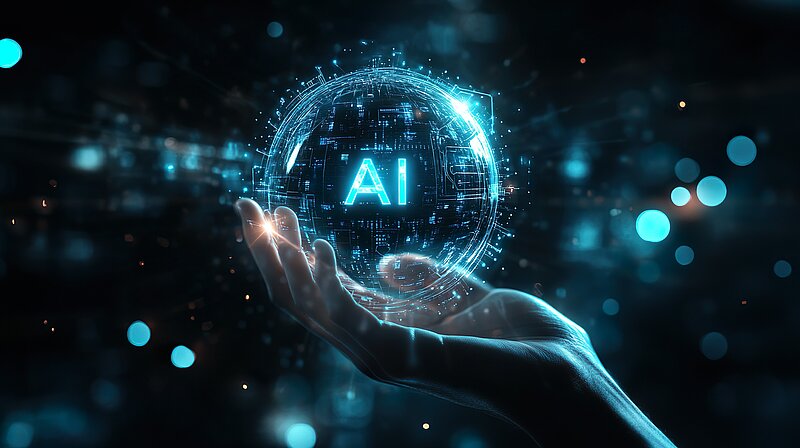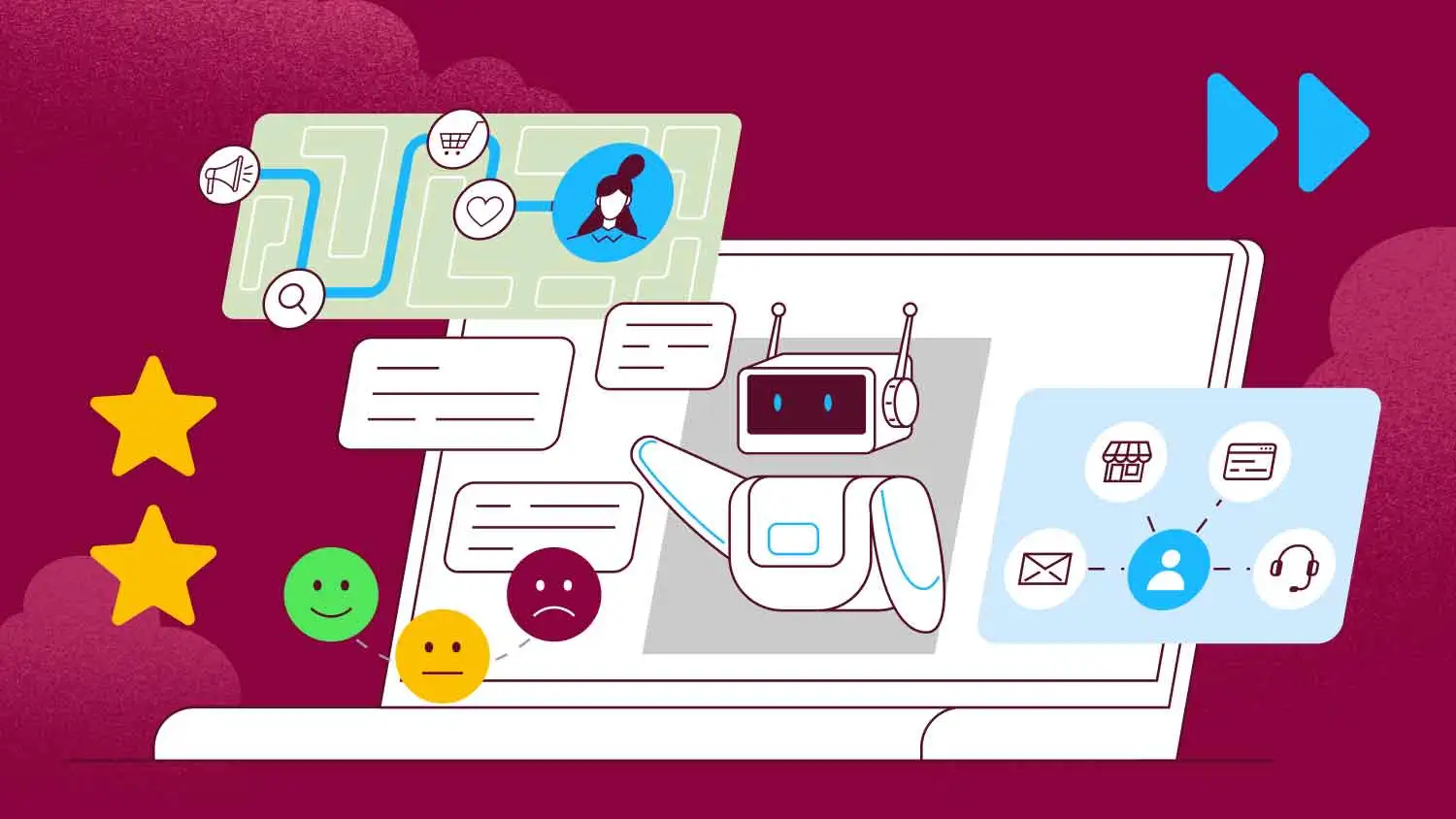AI, and especially AI agents, can go from buzz to bust, or from buzz to better business. It’s up to you. For those who succeed, it’s a genuine game-changer for customer experience. As businesses navigate the fast-paced digital world of customer service, AI agents have evolved from an emerging trend to an essential tool.
In 2025, we’ll see some innovations that will solidify its importance even more. In this blog article, I’ll explore how you can integrate AI into your customer experience strategy and start seeing real results.
The role of AI in customer experience
First, let’s look at the different types of AI and their impact on customer experience. AI can be broken down into three main categories: predictive AI, generative AI, and AI agents. Each type brings its own set of benefits and applications that can improve how businesses connect with their customers.
- Predictive AI: This type of AI is useful for forecasting customer behavior, optimizing resource allocation, and enhancing operational efficiency. For example, predictive AI can help your business anticipate what customers might need, figure out the right number of staff for a shift, and predict the most common reasons for customer inquiries. It helps you deliver effective proactive customer service.
- Generative AI: Thanks to tools like OpenAI’s ChatGPT, generative AI makes interactions between customers and businesses more natural and engaging. It can create personalized content and responses, which enhances the customer service experience. For instance, AI can help your customer service reps by generating personalized responses, summarizing conversations, and providing real-time data insights.
- AI Agents: This is the newest and most advanced form of AI, and tools like Salesforce’s Agentforce are leading the way. AI agents go beyond traditional workflows by enabling large action models to carry out complex tasks. It can automate intricate processes, launch actions based on customer interactions, and seamlessly integrate various data sources — all within the guardrails your business has set. Agentforce uses Salesforce’s metadata-driven platform to ensure data trust and operational excellence.
Expert tip: AI agents can also interact with each other, opening up whole new possibilities for AI in customer experience that we’ve never seen before. (Back to top)
Tailoring AI for different business models B2B vs. B2C
AI in customer experience can vary a lot between B2B and B2C environments. Understanding these differences is crucial for businesses to make the most of AI.
In the B2B customer service space, personalization is a must. Our research backs this up: 81% of service pros say customers expect a personal touch more than they used to. Building deep, personalized relationships with customers is critical to driving loyalty. AI can help by providing detailed insights into customer behavior, preferences, and needs, allowing businesses to offer personalized solutions and proactive customer service.
Expert tip: Agentforce can insert your company’s tone, style, and brand into the AI-generated responses, making them feel more personal and consistent.
On the other hand, B2C companies often focus on operational efficiency and scalability, while still maintaining the appearance of a personal touch. AI helps by automating customer interactions, reducing the need for human intervention, and providing personalized recommendations based on customer data. For instance, AI agents like Agentforce can handle both routine and complex inquiries, process transactions, and offer product suggestions, all of which enhance the overall customer experience.
What B2B and B2C businesses share in common is the need to handle hundreds of operational tasks quickly, accurately, and at scale. AI can excel in this area, making life easier for everyone involved.
Expert tip: The Serviceblazer on Slack Community is an excellent resource for B2B and B2C customer service leaders to learn best practices for using AI in customer experience. It’s also a great place to find your next hires — join today. (Back to top)
Real-world use cases
Let’s look at three real-world examples of how AI is revolutionizing customer service in both B2B and B2C environments.
- Salesforce faced a challenge with its Help page, which receives over 60 million visits annually. Reps were overwhelmed with routine tasks like password resets, leading to delays in addressing complex issues. To improve efficiency, Salesforce introduced Agentforce, a 24/7 AI concierge integrated into the Salesforce platform. In just two months, Agentforce was deployed to handle routine inquiries, perform common tasks, and escalate complex issues to reps with full context. This integration with Salesforce CRM and Data Cloud allows Agentforce to access and analyze vast amounts of data, providing immediate, personalized responses. So far, 83% of customer queries on our site are handled by Agentforce without human intervention, significantly reducing the need for support tickets and wait times. By handling routine tasks and providing precise, context-aware answers, Agentforce frees up reps to focus on building deeper customer relationships, enhancing overall customer satisfaction and loyalty.
- A smart home security and automation company needed a scalable solution to handle the growing service demands from their expanding customer base. They turned to Salesforce’s Agentforce to provide 24/7 smart home device troubleshooting and enhance customer support efficiency. Initially skeptical about a prebuilt solution, the company realized that Agentforce seamlessly integrated with their existing systems, offering a robust and scalable alternative to their DIY approach. Agentforce autonomously handles routine inquiries and troubleshooting, pulling data from the company’s knowledge base, Service Cloud, and IoT devices to provide precise, context-aware responses. If an issue requires human intervention, Agentforce smoothly transitions the case to a live rep with full context, ensuring a seamless customer experience. This integration has allowed the company to reduce handling times, improve service rep efficiency, and streamline costs, setting the stage for even smarter and more personalized customer interactions.
- A luxury travel company struggled to meet high customer expectations post-pandemic while scaling their services. With 80 customer service specialists managing nearly 180,000 annual contacts, they needed a more efficient system. In 2022, they introduced Einstein Bots, which resolved 10% of queries automatically. However, many personalized requests still required human support. To further enhance efficiency, the company implemented Agentforce, which automates routine tasks and simplifies workflows. Agentforce now resolves 30% of customer requests through live chat autonomously, allowing specialists to focus on more complex issues. This integration has led to faster, more efficient customer support, with the company building and launching their agent in just two weeks, compared to the six months it previously took. The result is a seamless, high-quality customer experience that meets the growing demands of their diverse customer base.



-p-1600.webp)

